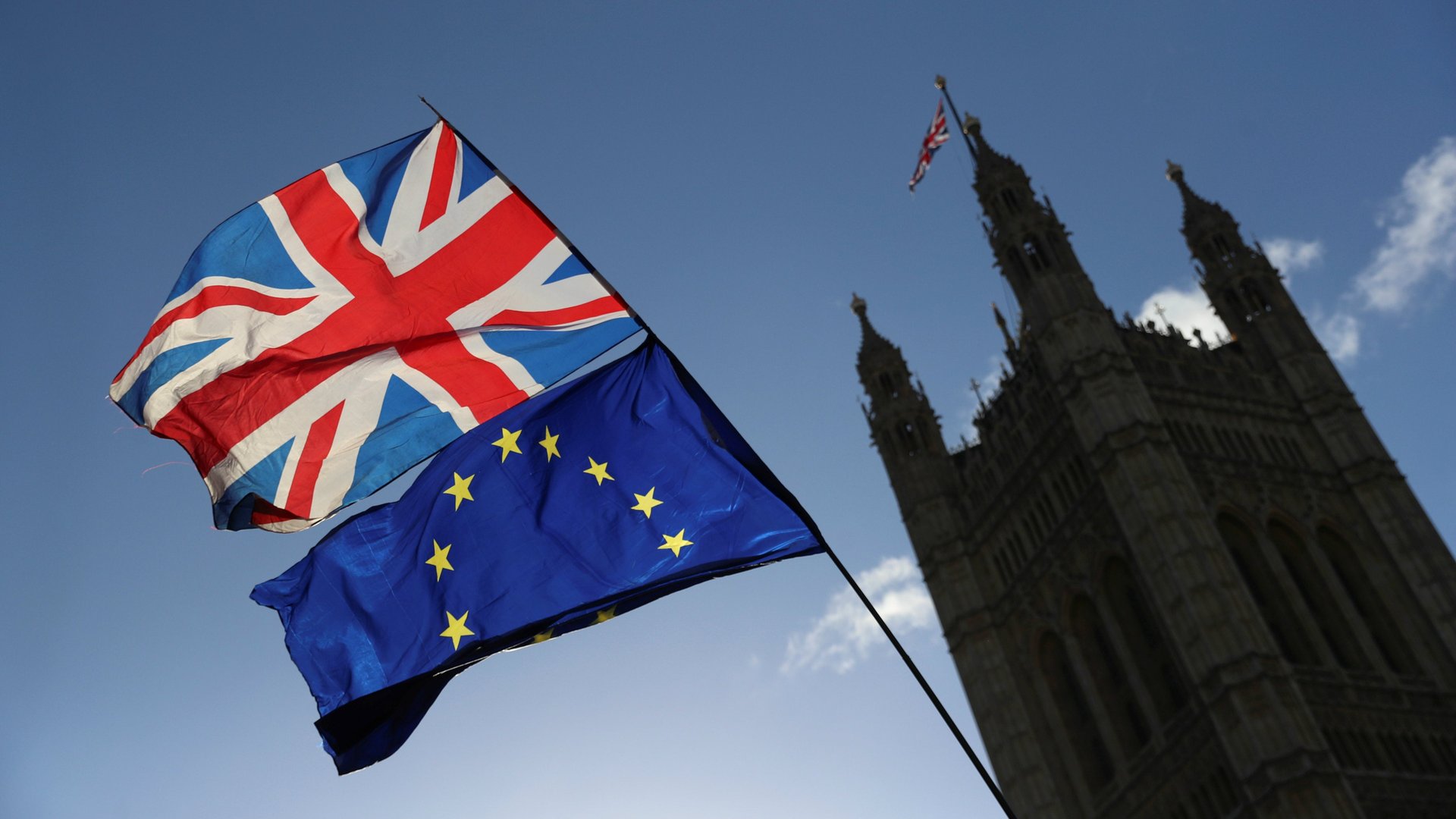Britain flirted with economic self-harm today
The UK parliament’s vote to rule out a “no-deal Brexit” gave Brits the opportunity to find out how many MPs thought the economic carnage that would come with abruptly quitting the EU was worth the price.


The UK parliament’s vote to rule out a “no-deal Brexit” gave Brits the opportunity to find out how many MPs thought the economic carnage that would come with abruptly quitting the EU was worth the price.
Lawmakers voted 321 to 278 tonight (March 13) against exiting the EU without a deal. Yesterday, they had soundly crushed prime minister Theresa May’s Brexit proposal—a series of arrangements to smooth Britain’s exit from the EU after the divorce becomes official.
The rejection of the so-called “no-deal Brexit,” widely expected, was the closest Britain has come (so far) to a cliff-edge EU departure. It leaves May’s stature as leader deeply wounded.
Tonight’s vote was “free,” meaning her fellow Conservative party members could vote as they wished, rather than being “whipped” to follow her government’s preferred path. Now another vote will take place tomorrow to decide whether to ask the EU for an extension to the official March 29 date of the divorce. Officials will have to spell out the purpose of the extension to the EU, which could include time to for the UK hold a general election or even another referendum on membership in the bloc.
A no-deal Brexit could still happen if the UK doesn’t ask for an extension, if the EU rejects one by the EU, or if no agreement is reached during an extension.
What’s at stake now?
If Britain leaves the EU (membership) without a deal or a transition period, UK financial firms, which have been preparing for this possibility, will lose their right to provide their services on the continent. EU nationals in the UK will require new types of visas for longer stays. Customs checks would be implemented at borders, disrupting the complex “just in time” supply chains many businesses rely on. The UK government has forecast that a no-deal Brexit could cut economic growth by about 7.6% (pdf) in the long term.
Some Brexiteers think these concerns overblown. The Telegraph, a right-leaning, mostly pro-Brexit newspaper, quoted an unnamed source, which it called a senior diplomat from an EU country, as saying that a “no deal won’t be an explosion, it will be a wet fart.” The article argued that the EU will blink, taking a softer line than some think, in order to protect its own economy from the disruption of severing all agreements with the UK overnight.
In the meantime, the UK Treasury today rushed out a schedule of temporary tariffs to be put in place in the event of a no-deal Brexit. “If we leave without a deal, we will set the majority of our import tariffs to zero, whilst maintaining tariffs for the most sensitive industries,” trade minister George Hollingbery said in the statement.
Carolyn Fairbairn, director general of the UK’s main business lobby group, said the tariff plan “tells us everything that is wrong” with Britain leaving the EU without a deal.
“[This is] the biggest change in terms of trade this country has faced since the mid-19th century being imposed on this country, with no consultation with business, no time to prepare,” she told BBC Radio 4’s Today program, as cited in the Financial Times. “This is no way to run a country. What we potentially are going to see is this imposition of new terms of trade at the same time as business is blocked out of its closest trading partner. This is a sledgehammer for our economy.”
The tariffs would apply for 12 months, and some 87% of UK imports by value would be eligible for tariff-free access, while the levies would still apply to things like beef and cars. The government said it would “take a temporary approach to avoid new checks and controls on goods” at Northern Ireland’s border with the Republic of Ireland.
Despite the fact that parliament voted against a no-deal Brexit this evening, such an outcome is still possible in the coming weeks. “A vote against having a ‘no deal’ Brexit does not rule it out as an accidental ‘no deal’ Brexit is still a possibility,” said David Zahn, head of European fixed-income at Franklin Templeton.
As things stand, with just over two weeks to go to Brexit day, British lawmakers have to agree among themselves on what sort of relationship they want the UK to have with the EU after Brexit, and then convince their counterparts from the bloc’s 27 other members to go along with it, too.
This story was updated with the outcome of the parliamentary vote on a no-deal Brexit.